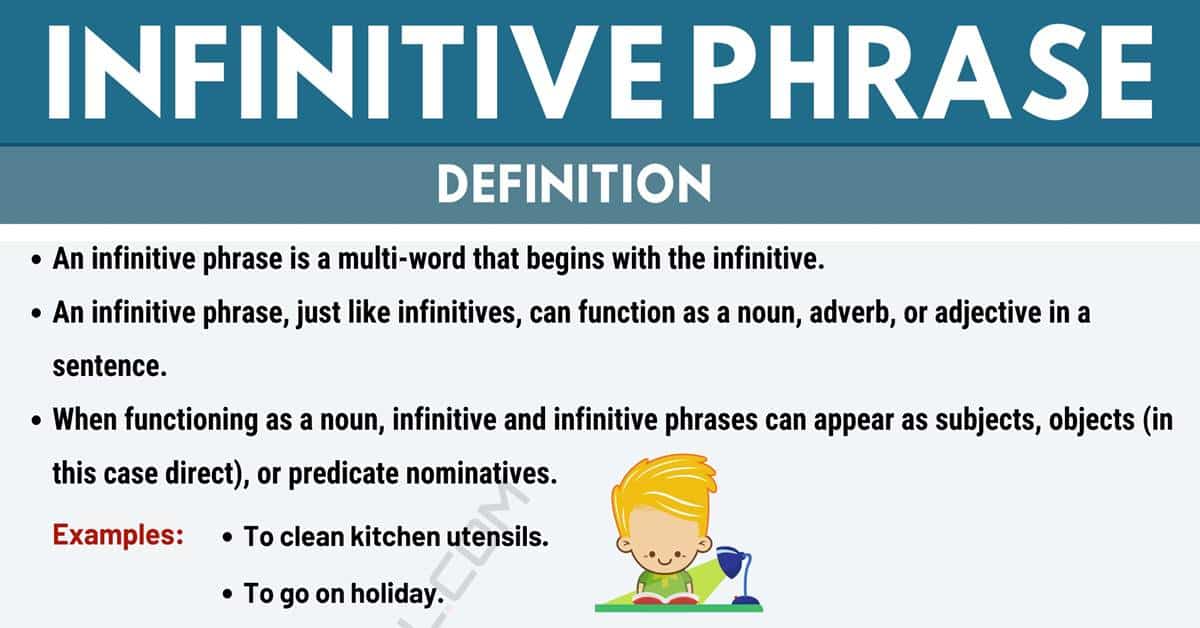Infinitive Phrase! This lesson goes to the detail of definition, components of infinitive phrases. you will also find different types of infinitive phrases with example sentences to help you learn English grammar easier.
Infinitive Phrase
Infinitive Phrase Definition
We can only understand what an infinitive phrase is by first understanding the meaning of the term infinitive. An infinitive is formed from a verb but functions as a noun, adverb, or adjective. It is composed of two words, “to” and “a verb”. The two words function as a noun, adverb, or adjective. Let’s look at the infinitive examples as a noun, adverb, and adjective.
- I love to fish. (noun)
- I won’t mind to wait. (adverb)
- The boy to return the book is Josphat. (adjective)
What Is An Infinitive Phrase?
An infinitive phrase is a multi-word that begins with the infinitive. An infinitive phrase, just like infinitives, can function as a noun, adverb, or adjective in a sentence. When functioning as a noun, infinitive and infinitive phrases can appear as subjects, objects (in this case direct), or predicate nominatives.
Here are examples of infinitive phrases:
- To clean kitchen utensils.
- To go on holiday.
- I told the candidates to revise thoroughly.
- I want to walk home quickly.
Components of An Infinitive Phrase
Infinitive phrases start with an infinitive, and at times take in modifiers and objects to make them more meaningful.
Infinitive
An infinitive is the main component of an infinitive phrase. In simple terms, an infinitive is a word “to” alongside a verb. Below are the examples to illustrate what it means:
- To walk (to +walk)
- To go (to +go)
- To drink (to +drink)
- To watch (to +watch)
Infinitives are spoken words describing an action and should not be mistaken with a prepositional phrase that starts with the word “to” alongside a noun or a pronoun.
Objects
An object can be a noun or a pronoun that receives the action of a verb. In an infinitive phrase, an object is a word that receives the action of the infinitive. The following are examples of infinitive phrases containing objects.
- To play football.
- To watch a movie.
- To attend the class.
- To eat mangoes.
Modifiers
A modifier can be an adjective or adverb that modifies other words in a sentence, making it more expressive. Let’s look at examples of infinitive phrases comprising of modifiers.
- To walk majestically. Here the adjective modifies “to walk.”
- To learn advanced computing. Here the adjective modifies “computing.”
- To play music loudly. Here the adverb modifies “to play”
Types of Infinitive Phrases
Infinitive phrases are easy to identify since they start with the word “to.” They can function as a noun, adjective, or adverb in a sentence.
Infinitive Phrase As a Noun
The infinitive phrase answers the question “what?” when functioning as a noun. In such a case, the infinitive phrase will be the subject which can also be a verb or an object which the verb exerts its action on. The following are the examples:
- I don’t like her. What don’t you like? (Object)
- He needs to do well in his final test. What does he need? (Object)
- My objective is to succeed. What is your objective? (Subject)
- Her role was to guide me in designing the software. What was her role? (Object)
Infinitive Phrase As An Adjective
When an infinitive phrase functions as an adjective in a sentence. It modifies a noun or a pronoun. This means that it will modify either a subject or an object. Below are the examples:
- I need a helper to assist me with house chores. Describes the helper
- I wish I had a lover to keep me company. Describes the lover.
An Infinitive Phrase As An Adverb
When an infinitive phrase takes the role of a verb, it describes the verb in a sentence. Here the infinitive phrase will answer questions such as “why,” “when,” “how,” and so on.
Examples of infinitive phrase as an adverb:
- To qualify to be a teacher, you need a good recommendation. Why do you need a good recommendation?
- I left school early to welcome my younger sister. Why did you leave early?
Infinitive Phrase Infographic








0 Comments